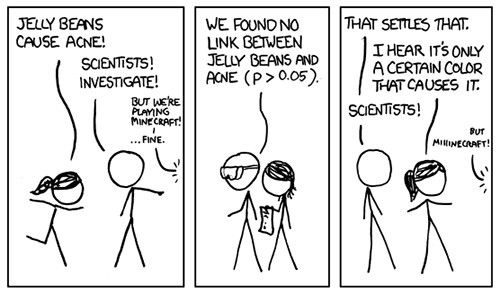Tag archives: scientific ethics
On the frontline of the ‘reproducibility crisis’
By Margaret Harris
The “reproducibility crisis” in science has become big news lately, with more and more seemingly trustworthy findings proving difficult or impossible to reproduce. Indeed, a recent Nature survey found that two-thirds of respondents think current levels of reproducibility constitute a “major problem” for science. So far, physics hasn’t been affected much; the crisis has been most severe in fields such as psychology and clinical research, which, not coincidentally, involve messy human beings rather than nice clean atomic systems. However, that doesn’t mean it’s irrelevant to physicists. Last month, I had the pleasure of speaking to three physics graduates who have become personally involved in addressing the reproducibility crisis within their chosen profession: medicine.
Henry Drysdale, Ioan Milosevic and Eirion Slade are third-year medical students at the University of Oxford. All three earned their undergraduate degrees in physics, and they now make up one-third of COMPare – an initiative by Oxford’s Centre for Evidence-Based Medicine (CEBM) that tracks “outcome switching” in clinical trials. As Drysdale explained to me over coffee in an Oxford café, researchers who want to perform clinical trials have to state beforehand which “outcomes” they intend to measure. For example, if they are trialling a new drug to treat high blood pressure, then “blood pressure after one year” might be their main outcome. But researchers generally keep track of other variables as well, and often their final report focuses on a positive result in one of these other parameters (a dip in the number of heart attacks, say), while downplaying or ignoring the drug’s effect on the main outcome.
View all posts by this author | View this author's profile
Oppenheimer and the Bomb
By Margaret Harris
It’s pretty easy to see why the Royal Shakespeare Company (RSC) wanted to stage a play about J Robert Oppenheimer. There is definitely a bit of Macbeth in the way this ambitious, aloof theoretical physicist rose to become the scientific leader of the Manhattan Project during the Second World War. Equally, there’s a hint of Caesar or Lear in Oppenheimer’s eventual downfall, which came thanks to a toxic combination of political intrigue and his own arrogance.
The parallels between “Oppie” and Shakespeare’s tragic heroes were highlighted on Saturday, when a group of physicists and artists gathered on stage at the RSC’s Swan Theatre for a panel discussion on “Oppenheimer and the Bomb”. The discussion was part of a programme of events related to the RSC’s production of Oppenheimer, a new play written by Tom Morton-Smith and based on Oppenheimer’s life in the 1930s and 40s. During the discussion, one of the panel members, director Angus Jackson, called Oppenheimer “a play about leadership” as much as science, noting that the leadership conflicts that Oppenheimer experienced were “comparable” to those of the heroes in the RSC’s traditional repertoire.
A question of responsibility
By Margaret Harris in Chicago
The first 45 minutes of Amy Smithson’s talk here at the 2014 AAAS meeting were interesting but not especially controversial. Smithson, a senior fellow at the Center for Nonproliferation Studies in Washington, DC, began by speaking about her role in combating the spread of nuclear, chemical and biological weapons over the past two decades, and how this made her persona non grata for both conservative Republicans and the Clinton White House during the 1990s. After drawing parallels between Iraq in the late 1980s and Syria today, she outlined some of the tactics that “bad guys” like Saddam Hussein and Bashar al-Assad have used to circumvent international weapons treaties and delay their enforcement.
At that point, Smithson changed tack. Warning that she was about to become “the skunk at the party”, Smithson turned her fire on the scientific community. Policy-makers, she observed, can’t make weapons of mass destruction on their own. For that, they need scientists, and over the past 60 years, “hundreds of thousands of scientists” have obliged by working on nuclear, chemical or biological weapons.
